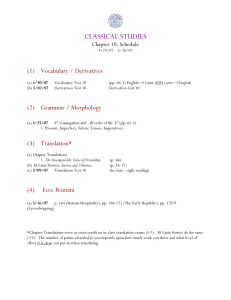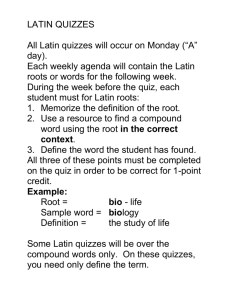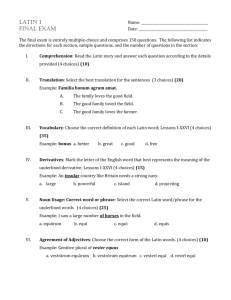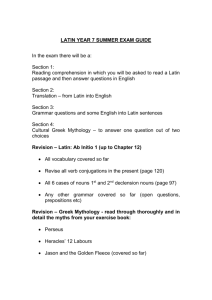Latin II Syllabus 2015-16
advertisement
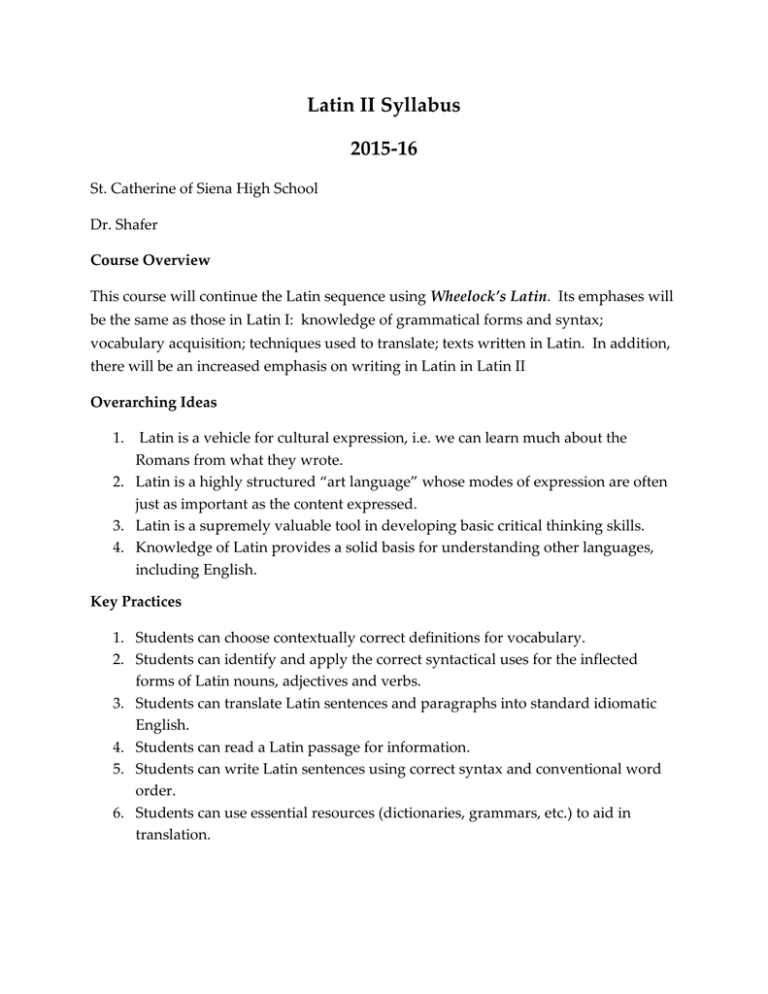
Latin II Syllabus 2015-16 St. Catherine of Siena High School Dr. Shafer Course Overview This course will continue the Latin sequence using Wheelock’s Latin. Its emphases will be the same as those in Latin I: knowledge of grammatical forms and syntax; vocabulary acquisition; techniques used to translate; texts written in Latin. In addition, there will be an increased emphasis on writing in Latin in Latin II Overarching Ideas 1. Latin is a vehicle for cultural expression, i.e. we can learn much about the Romans from what they wrote. 2. Latin is a highly structured “art language” whose modes of expression are often just as important as the content expressed. 3. Latin is a supremely valuable tool in developing basic critical thinking skills. 4. Knowledge of Latin provides a solid basis for understanding other languages, including English. Key Practices 1. Students can choose contextually correct definitions for vocabulary. 2. Students can identify and apply the correct syntactical uses for the inflected forms of Latin nouns, adjectives and verbs. 3. Students can translate Latin sentences and paragraphs into standard idiomatic English. 4. Students can read a Latin passage for information. 5. Students can write Latin sentences using correct syntax and conventional word order. 6. Students can use essential resources (dictionaries, grammars, etc.) to aid in translation. Course Requirements 1. Homework: students will have homework (15-30 min.) most nights. The homework is designed to revisit new grammar and vocabulary. 2. Quizzes: We will have fairly regular (1 per week) quizzes on new forms and vocabulary. It is expected that once we begin a new chapter you will begin to memorize the vocabulary and new forms in that chapter. 3. Assessments: The unannounced exercises will be given regularly each quarter. Their goal is to see how well you can apply the principles we learn in class to “real” situations. These assessments will focus either on translation of a text comprehension or grammar. Assessments will always be open book/notes, so it is to your advantage to be organized. 4. National Latin Exam: All students will be required to take the National Latin Exam in the spring. The exam score will not affect the student’s grade but will help determine how St. Catherine students perform against peers across the country. There will be a small fee to take the exam. Textbook: Frederic M. Wheelock and Richard LaFleur, Wheelock’s Latin, 7th ed. Grading: We will be using the grade scale outlined in the student handbook. I use a total points system. I do not give (or believe in) extra credit, but I will at times provide an additional optional assignment to allow students to demonstrate mastery after a disappointing performance on a test. For information on academic probation and athletic ineligibility, please refer to the student handbook. Absence Policy: All assignments are due on a specified date. I realize that extenuating circumstances do occur on occasion. If a student is struggling to complete an assignment, is ill or there is an emergency, please contact me in person or through email and I will make necessary accommodations at my discretion and school policy. If a student is absent she will have the number of days she was absent to complete the work. Missed tests will be made up the day the student returns to class unless other arrangements have been made. Failure to make up assignments or tests will have a negative impact on a student’s class grade. Tardy Policy: Upon a first tardy entrance to class, you will be warned. A second tardy entrance will result in a referral to the Dean of Discipline. If you are coming in tardy from another class, you MUST have a pass explaining your late arrival. Late Work: Work is due at the beginning of class. I will accept late work, but for reduced credit. Behavior Expectations: Basic rules of courtesy apply to the classroom. We will treat each other with respect. Abusive language or continuous interruptions will not be tolerated. If I or another student is speaking, then everyone else should be respectfully listening. It is expected that you will be attentively engaged in the material, asking questions, etc. The use of cell phones, laptops and other devices is prohibited unless permission is granted by the teacher. Cell phones and laptops will be confiscated if used in class without authorization or in violation of school policy. Confiscated items will be returned after school via the office. Repeated or particularly egregious infractions regarding behavior may result in detention or referral to the Dean of Discipline. Course Content Below is a description of the grammatical and cultural components of the course. The list of activities may undergo alteration depending on the instructor’s prerogative and student interests. Unit I (Q1) Textbook Chapters Language Content Wheelock 17-20 Relative pronouns and clauses; present passive system of verbs; ablative of agent; perfect passive system of verbs; interrogative pronouns; interrogative adjectives; fourth declension; ablative of place from which and separation. Culture Themes Activities Mythology; types and uses of myth; creation stories Synopses; form and vocabulary quizzes; comprehension assessment; grammar assessment; translation assessment; translation; primary source reading and interpretation; reading secondary sources for information. Unit II (Q2) Textbook Chapters Language Content Wheelock 21-23 Fifth declension nouns; ablative of place where; third and fourth conjugation verbs- present passive system; participles. Culture Themes Succession myths; the Titans; the Olympians Activities Synopses; form and vocabulary quizzes; comprehension assessment; grammar assessment; translation assessment; translation; primary source reading and interpretation; reading secondary sources for information. Unit III (Q3) Textbook Chapters Language Content Wheelock 24-27 Ablative absolutes; passive periphrastic; dative of agent; infinitives; indirect statement; comparison of adjectives. Culture Themes Roman gods and religion; the mythical founding of Rome; Roman state religion; temples and statues. Synopses; form and vocabulary quizzes; comprehension assessment; grammar assessment; translation assessment; translation; primary source reading and interpretation; reading secondary sources for information. Activities Unit IV (Q4) Textbook Chapters Language Content Wheelock 28-30 Subjunctive mood; present, imperfect, perfect and pluperfect subjunctives; purpose clauses; result clauses; indirect questions; sequence of tenses. Culture Themes Religious rituals; emperor worship; the Pantheon; Romans and Christians. Synopses; form and vocabulary quizzes; comprehension assessment; grammar assessment; translation assessment; translation; primary source reading and interpretation; reading secondary sources for information. Activities


